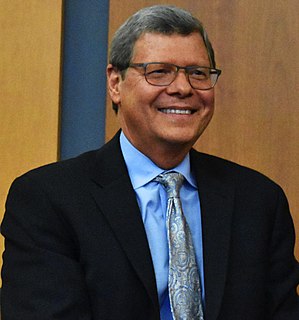A Quote by Robert Kennedy, Jr.
PBS was not a left-wing ideology. I mean, Air America was, but PBS was not. But anybody who tells the truth is now branded and marginalized. The devolution of the American press began in 1986 when Ronald Reagan abolished the fairness doctrine.
Related Quotes
I'd like my grandkids to be able to watch PBS. But I'm not willing to borrow money from China, and make my kids have to pay the interest on that, and my grandkids, over generations, as opposed to saying to PBS, 'Look, you're going to have to raise more money from charitable contributions or from advertising.'
The current public television and radio system in the United States, while it's better than nothing, that's about the best you can say about it. It's nowhere near the standard it needs to be for our society, and we've got to make a commitment to rethink the system altogether. You know, just giving more money to what exists on PBS now would be not great; we've got to have a new vision of PBS.
Back in 1980, the conservative movement was all-in for Ronald Reagan. Once Reagan won, they all wanted to be on the team. It was a landslide. Everybody wants to bask in that glow. And then as the Reagan years began, then the Republicans, certain members of the party began to individually fall out and start talking about problems they had, secretly telling the media they thought Reagan was a dunce and a danger to world peace, adopting the Democrat line that Reagan's finger on the nuclear button couldn't be trusted.
When I lived in California, 1984 to '87, it was a Republican state. Sacramento where I lived was 73% Democrat voter registration, when I got there. It was in the sixties when I left. We had amazing success in converting Democrats in Sacramento. But Pete Wilson, Ronald Reagan, all people elected governors and so forth, it's only been with the advent of the 1986 immigration bill that we lost California, if I might say, and now it's just gone so far left they're seriously talking about seceding.
You want to unify America with a sense of culture and decency and all of this that reasserts and reaffirms the concepts of American exceptionalism.But the left and who they are, you watch Hollywood, you watch the Oscars, you watch any left-wing, it's not even Democrat. It is ultra left-wing radical.
Ronald Reagan's legacy is deeply misunderstood because there are political actors in America who, for several reasons, have privately held agendas that they want to sell to the American public in the most appealing way possible. They often find the best way to do that is to package their product with the Reagan brand.


































